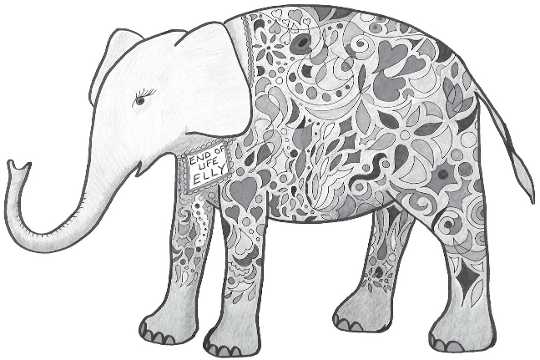
Image by Sasin Tipchai
Humans often spend an inordinate amount of time and energy avoiding the fact that there is an elephant in the room. This phrase refers to an important topic which everyone is aware of but which isn’t discussed due to the topic being perceived as uncomfortable to talk about.
But how on earth did dying and death (and the associated grief) become an elephant? It’s not so long ago that (in country areas at least) the deceased were laid out at home, the coffin placed in the front room of the house for viewing, or the body laid in bed, available for whoever wanted to pay their last respects.
Only 50 years or so ago the bereaved wore black armbands for many months, to show they were mourning and needed to be treated more gently, just as we behave towards mothers who are pregnant. As health has improved, however, and as we live longer, in Western society it has become more and more unusual even for middle-aged adults to have seen a dead body. This brings with it a fear of what death actually is, and a general disinclination to admit that it will happen at all. Hence the elephant in the room.
Most of us choose to see only the room, not the elephant in it. Even when it is towering over us, as in being diagnosed with a terminal illness, or a life-limiting disease, many still choose to pretend the elephant doesn’t exist. It then befalls to the family and friends left behind to clear up the mess after that person has died. Because an individual’s life is messy.
Just look around you right now, wherever you are. If you had died yesterday, what would your loved ones find (apart from your dead body)? Would they be able to easily tidy things up? Would they need to start a detailed search through mounds of ‘stuff’ (online and offline) for important documents? Could they easily find your list of contacts or address book?
Admitting the elephant exists is the first stage in accepting that life includes the end of it too.

This is a drawing I spontaneously did when I first realized my work was going to be focused on something that many people didn’t want to talk about.
To acknowledge the presence of End of Life Elly, you have to admit an elephant exists in the first place. You can do this right now by simply saying ‘hallo’ to Elly, out loud. By doing this you are beginning the process of admitting that death happens. We will die. Our family and friends will die. We will feel grief, and they will too when we die. We don’t know when it will happen, but it will happen at some point. Once you have said ‘hallo’, you can turn around and face her with any one of these 3 steps:
- Take a walk outside in nature, and consciously use your five senses as you walk. The walk could be around your garden, a park, a wood; anywhere there are plants, trees, bushes, wildlife. Take 15 minutes on that walk to deliberately look for signs of both life and death. Notice that seedling growing; then notice the dead leaves from earlier that are being ground up into little pieces under your feet. Hear the birdsong. Touch the bark on a tree and notice the texture and how it makes you feel. Pick up a twig or piece of wood. Feel it, while understanding that this is a piece of a larger tree or bush, but it is ‘dead’. Notice any living and dead animals you see. Become aware that life itself includes death, just as death includes life. Contemplate the idea that the body you inhabit is just the same as a tree, plant or animal that dies.
- Visualize Elly in your room, right now. Just see her standing, benignly, in the corner. Imagine saying hallo to her. When you do this you are saying hallo to the presence of death within life. Notice how this makes you feel, and what thoughts you have about it. Have a conversation with her if you feel brave enough – you might find yourself surprised at what she has to say.
- Acknowledge that your own death will take place. Pay attention to how you feel about that. Jot down your thoughts in a journal. If it feels really scary still, then just notice that and leave it for now. You can come back to it later.
“When I start to think about my own death, I feel terrified of not existing. That means I just don’t want to look at this kind of end of life stuff at all. And yet I know I have to.” — Michael, England
How Do You Know There Is an Elephant in the Room?
You feel uncomfortable around whatever topic the elephant represents. It’s that simple. Everyone will feel it, to a lesser or greater degree, it just depends on how aware you are. Elephants are everywhere, not just to do with death, although that’s what we are focusing on here.
The other day, I was being interviewed for a place on a business course. I entered a room where there were four other candidates. No-one was speaking and there was an atmosphere of tension in the room. There was definitely an elephant lurking, the one called ‘we mustn’t talk to each other because we are all competing for a place on the course’.
I’m known for addressing elephants, whether they’re called End of Life Elly or not. So I started to speak. It took a while, but before long, we were all talking and engaging with each other, and had moved from an atmosphere of competition to one of more relaxation, and hoping the best for everyone. Phew!
What Happens When End of Life Elly Doesn’t Get Acknowledged?
Elly doesn’t mind if she gets acknowledged or not. The onus is on you to interact with her - she (death) is there, whether you like it or not. However, if she isn’t paid attention to, she will cause problems.
I mentioned before about the mess that has to be cleared up when someone dies without any of their affairs organized. The way this mess shows up is in administrative muddles, problems with relationships as people adjust to their loved one not being there any more, arguments, long-standing disputes erupting, legal battles, inability to move on, and a lot of time and unnecessary expense being involved.
Think of Prince, the famous pop star, who died suddenly in April 2016. He had not prepared well for a good end of life; hadn’t even left a will. Now sorting out his affairs will take the family and solicitors many years, and thousands of dollars, before it is all resolved. Is this really how you want to leave things for your family?
You may not be a millionaire but I’m sure you still have treasured possessions. However, even when you have the best of intentions, doing this work takes courage, commitment and confidence.
What Happens after Elly Has Been Acknowledged?
After Elly has been acknowledged, she will no longer be an elephant in the room. Instead, she will become a useful part of the furniture. She doesn’t go away, but she certainly won’t be causing trouble after your family member or friend dies; instead she will be a benign presence, just part of life itself. She will enable you to more fully focus on being alive, and gain the most from doing so. She’ll encourage an ironic joke or two, or even full-blown laughter.
Acknowledging her will also make it easier for you to be around people who are grieving, as well as those who are dying.
©2018 by Jane Duncan Rogers. All Rights Reserved.
Excerpted with permission from the book: Before I Go.
Publisher, Findhorn Press, an imprint of Inner Traditions Intl.
www.findhornpress.com
Article Source
Before I Go: The Essential Guide to Creating a Good End of Life Plan
by Jane Duncan Rogers Many people say “I wish I had known what they wanted” when their loved one has died. Too often, a person’s wishes for end-of-life care, and for after they have gone, have not been recorded. With this valuable guide, you can now begin to do this for yourself, so your relatives will be able to honor your wishes more easily, saving them unnecessary stress and upset at a potentially intense time. (Also available as a Kindle edition.)
Many people say “I wish I had known what they wanted” when their loved one has died. Too often, a person’s wishes for end-of-life care, and for after they have gone, have not been recorded. With this valuable guide, you can now begin to do this for yourself, so your relatives will be able to honor your wishes more easily, saving them unnecessary stress and upset at a potentially intense time. (Also available as a Kindle edition.)
For more info or to order this book, click here. Also available as a Kindle edition.
More Books by this Author
About the Author
 Jane Duncan Rogers is an award-winning life and death coach who helps people prepare well for a good end of life. Having been in the field of psychotherapy and personal growth for 25 years, she is founder of Before I Go Solutions, dedicated to educating people about dying, death, and grief. Jane lives within the Findhorn community in Scotland, UK. Visit her website at https://beforeigosolutions.com/
Jane Duncan Rogers is an award-winning life and death coach who helps people prepare well for a good end of life. Having been in the field of psychotherapy and personal growth for 25 years, she is founder of Before I Go Solutions, dedicated to educating people about dying, death, and grief. Jane lives within the Findhorn community in Scotland, UK. Visit her website at https://beforeigosolutions.com/
























